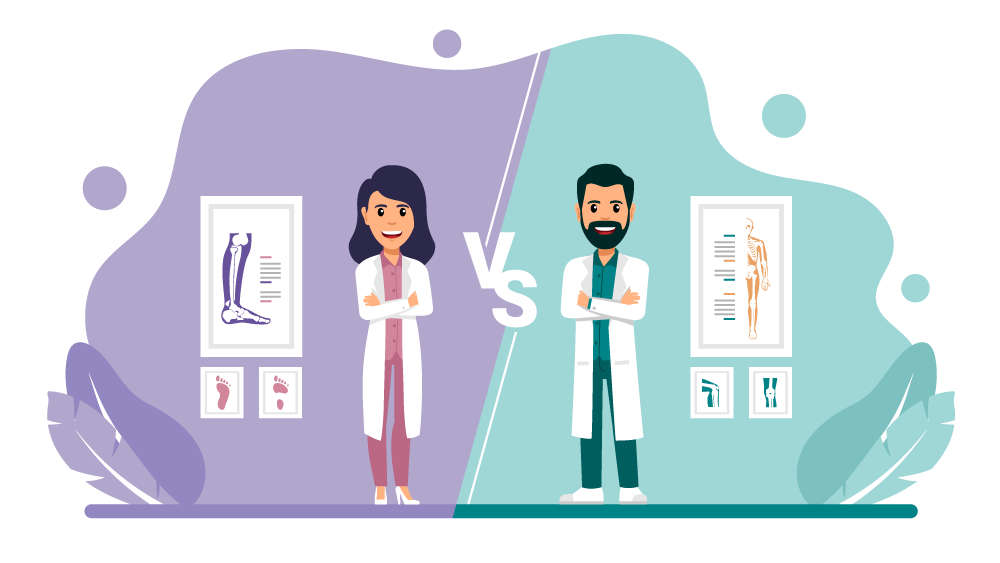It may not be easy to understand the difference between a podiatrist and an orthopedist. If you’re trying to choose the right medical career for you, it’s important to know the differences between these two options. Let’s look at a few of the differences and what each of these is for a better understanding.

What is a Podiatrist?
A podiatrist is a Doctor of Podiatric Medicine or D.P.M. This type of doctor will have expertise in the foot, ankle, and lower leg. This type of doctor will treat many different things including:
- Ingrown toenails
- Fallen arches
- Foot injuries
- Heel spurs
- Calluses
- Ankle injuries
- Foot deformities
- Plantar fasciitis
- Metatarsalgia
- Hallux rigidus
- Gout
- Flat feet
A podiatrist may also provide treatment for foot issues related to systemic illnesses, such as diabetes. It’s common for a podiatrist to use X-rays and lab tests to diagnose issues in patients.
Podiatrists commonly work in hospitals, extended care facilities, municipal health departments, private and group practices, and for the armed forces.
Necessary Education to Become a Podiatrist
you will need to gain a bachelor’s degree and go on to complete a four-year podiatric medicine program to become a podiatrist. Once you complete the podiatric medical degree, you will need to complete a residency program.
Along with completing a residency program, you will need to pass the necessary exams to gain the license in your state. You might need to complete further education to specialize in primary care, diabetes care, geriatrics, surgery, or pediatrics.
Overall, it will take between 11 and 12 years to become a podiatrist. This includes the time getting your undergraduate degree, your medical degree, and completing your residency. In some cases, you may be able to complete the education in 10 years, if you can find a two-year residency.
What is an Orthopedist?
An orthopedist is also known as an orthopedic surgeon. This type of person is a medical doctor with an M.D. or a D.O. degree. This type of doctor will treat disorders related to the entire skeletal system of the body. Some of the types of things you might treat as an orthopedist include:
- Bone fractures
- Joint issues
- Joint replacements
- Torn knee ligaments
- Hand issues
- Ruptured spinal discs
- Achilles’ tendinitis
- Ligament tears
- Plantar fasciitis
- Lisfranc injury
- Metatarsalgia
It’s common for an orthopedist to use X-rays, lab tests, and MRIs to diagnose patients. An orthopedist may prescribe medications, surgery, or physical therapy to treat the injury or health issues.
An orthopedist will commonly work in a specialized practice, at a university medical center, in a hospital, or at a private clinic.
Necessary Education to Become an Orthopedist
Becoming an orthopedist will start with a bachelor’s degree and gaining admittance to a four-year medical school. You will also need to complete a one-year internship and a surgical residency, which will last three to four years.
If you plan to specialize, you will likely complete a fellowship in the specialty of your choice. It will take about 13 years to complete your schooling to become an orthopedist. If you plan on specializing, add an additional year for a total of 14 years of education.
Podiatrist vs Orthopedist: The Salary
If you become a podiatrist, you can earn a very nice salary every year. According to ZipRecruiter.com, the average salary for a podiatrist is about $130K per year. The range goes from $49K to about $208K per year. Your location and actual employer will help to determine your salary as a podiatrist.
According to Salary.com, an Orthopedic Surgeon can earn a Median salary of about $505K per year. The range runs from about $298K to about $788K per year. Your actual salary will depend on your employer and location.
Podiatrist vs Orthopedist: Main Differences
When you decide to become a podiatrist or an orthopedist, you will assess, diagnose, and treat injury and illness for your patients. The similarities don’t go much further, even though these two types of doctors may work side-by-side.
An orthopedist will have a more comprehensive knowledge of the entire body. They will focus on treating ailments and diagnosing issues throughout the entire musculoskeletal system.
A podiatrist will focus on the lower extremities instead of the entire body. This type of doctor will treat the lower leg, ankle, and feet.
It’s necessary to go through a longer residency as an orthopedist than a podiatrist. As an orthopedist, you will need to go through a five-year residency, while a podiatrist only goes through a two-year residency.
While these two types of doctors are rather different, they can both prescribe medication, perform surgery, and reset bones.
Are These Two Careers Growing?
Yes, both the career of a podiatrist and of an orthopedist are growing, but not that fast. The job growth for podiatrists is expected to grow at a rate of 2% over the next ten years. The career of an orthopedist is growing at just a slightly higher rate of 3% over the next ten years.
Neither of these careers is growing as fast as the average of all occupations. However, with baby boomers aging, it’s likely these two careers will continue to grow and the job growth rate could go up.
Podiatrist vs Orthopedist: Which Career is Right For Me?
You can make a very good salary by becoming a podiatrist or an orthopedist. Both pay very well, but if the decision comes down to the salary, you will likely want to become an orthopedist.
Of course, if you want to complete your education faster, you want to become a podiatrist. Those planning to specialize in the foot, ankle, and lower leg should also become podiatrists. However, if you want to work with the entire body, become an orthopedist.
There is no wrong or right answer when comparing a podiatrist and an orthopedist. These two careers are both doctors and both pay very well. However, one may fit better for you than the other.
Making the right decision may depend on the amount of time you want to go through schooling. It may depend on how much money you want to make. Of course, the decision may depend on which area of the body you prefer to specialize in.




